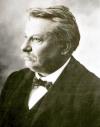And the blue sea loved him, swept him
far out for nine days and nights,
swept him to a distant island,
to the cave covered with leaves
of grape vines blooming to the edge.
And around it, a gloomy forest
of alders and pungent cypresses;
and hawks and owls and squawking crows
making their nests there. And nothing left alive,
neither god nor man, ever stepped there.
Then, among the leaves of the forest, the hawks
beat their noisy wings, chasing out
the owls from holes in the old trees,
and from branches, the squawking crows
flapped at the thing that came from the sea.
And Calypso wove a song inside herself,
near the fragrant blaze of a cedar,
astonished, hearing an uproar in the forest,
and, in her heart, said: Oh, I heard omens,
the voice of the crow and the hoot of the owl!
And among the dense leaves the hawks are fluttering.
Is it because they have seen, on the crest of a wave,
some god, who, like a huge cormorant, dives through
the impossible whirlpools of the sea?
Or moves without footsteps, like the wind, over
the soft meadow of violets and white flowers?
But it seems too far away for me to hear.
There's a hatred the gods have for solitary
Calypso. And I know it well, from when
I sent the man I loved back to the sea
to his sadness. O can you see, owl
with your round eyes, and you, squawking crows?
And so she left, gold spool in hand,
and kept watch. He lay on the earth, beyond
the sea, at the foot of the cave, just a man, sleeping
on the last journeys wave: and he, white-headed,
knew that cave of hers very well,
and above him a vine shoot, trembling
a little, hung with long clusters of grapes.
It was Odysseus: the sea returned him
to his goddess: it brought him back dead
to the solitary Calypso, to the deserted island
that branched out from the navel of the eternal sea.
Naked, he returned, who once was clothed in garments
of plants the eternal goddess gave him;
white and trembling in death, he who once
wore the immortality of his youth.
And she wrapped the hero in a cloud
of her hair, and she howled across the arid
waves where no one could hear:
"Not to be! Not to be! More than nothing,
but less than dead, not ever to be again."






